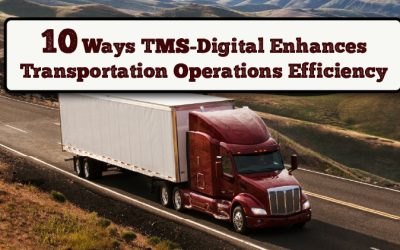
In today’s rapidly evolving supply chain landscape, the pivotal role of transportation management cannot be overstated. As businesses navigate the complexities of planning deliveries, managing carriers, and tracking shipments, the adoption of a modern Transportation Management System (TMS) emerges as a game-changer. According to a recent report by Grand View Research, the global TMS market is poised for remarkable growth, projected to surge at a compound annual growth rate (CAGR) of 14.6% from 2022 to 2030. To meet consumers’ ever-growing demands and stay competitive, businesses must leverage smart technologies that promise seamless customer experiences. Here, we delve into the myriad reasons why integrating with a robust TMS is imperative, elucidating how it can reduce business costs and enhance satisfaction for end customers.
Understanding the Essence of a Transportation Management System
At its core, a Transportation Management System facilitates the meticulous planning and execution of goods movement, offering comprehensive visibility from the inception of a shipment to its final destination. Irrespective of whether you operate as a manufacturer, distributor, or third-party logistics provider, a TMS serves as a linchpin for efficient package tracking, with a control tower providing real-time analytics support.
Unlocking the Benefits of a Transportation Management System
- Unparalleled Visibility: Gain real-time insights into the whereabouts of goods and shipments in transit, enabling proactive decision-making and course correction.
- Strategic Order Allocation: Plan and allocate orders based on geographic regions and carrier capabilities, optimizing resource utilization and enhancing operational efficiency.
- Minimized Manual Interventions: Streamline operations and minimize delays by reducing manual interventions, enhancing delivery times and customer satisfaction.
- Actionable Business Insights: Harness data-driven insights to identify opportunities for process improvement and drive continuous optimization across the supply chain.
- Cost Reduction: By streamlining operations and optimizing resource allocation, a TMS facilitates cost reduction, benefitting both businesses and end customers alike.
- Cloud-Based Deployment: Embrace TMS-Digital’s cloud-based TMS for rapid deployment, minimal training requirements, and regular updates, ensuring enhanced operational efficiency and security.

Why opt for a Transportation Management System?
- Automation: Embrace automation to streamline supply chain management processes, mitigate errors, optimize shipping costs, and enhance operational efficiency.
- Enhanced Visibility: Leverage TMS to gain comprehensive visibility into logistics, enabling proactive issue resolution and seamless operations management.
- Order Management: Empower operations teams, drivers, and customers with detailed order information, including route assignments, ETAs, and proof of delivery, fostering transparency and accountability.
- Live Delivery Tracking: TMS-Digital’s capabilities to track shipments in real-time, optimize schedules, and provide accurate ETAs, thereby minimizing wait times and enhancing customer satisfaction.
- Carrier Rate Management: Utilize advanced rate management features to set base rates, negotiate discounts, manage contract agreements, and implement custom pricing strategies, optimizing cost efficiency.
- Crate Planning and Optimization: Maximize truck space utilization by leveraging TMS capabilities for crate planning and 3D packaging optimization, enabling efficient inventory management and space utilization.
- Integration Capabilities: Seamlessly integrate TMS with existing IT systems for streamlined data exchange, ensuring seamless collaboration across ERP, WMS, OMS, CRM, and other platforms.
- Optimized Route Planning: Leverage TMS functionalities for efficient route planning, minimizing fuel consumption, reducing carbon footprint, and ensuring sustainable deliveries.
- Enhanced Customer Experience: Bridge the gap between order management and warehouse systems to deliver superior customer experiences, fostering loyalty and driving business growth.
- Business Intelligence and Analytics: Harness the power of TMS analytics to gain actionable insights into carrier performance, driver efficiency, fleet management, and operational workflow, driving informed decision-making and maximizing customer satisfaction.
Conclusion
In an era marked by relentless advancements in the transportation and logistics domain, the adoption of a robust Transportation Management System has transcended the mere necessity to become a strategic imperative. TMS-Digital’s configurable TMS stands at the forefront of innovation, offering seamless integration, regulatory compliance, and sustainability-driven solutions tailored to meet evolving customer needs.
By embracing our TMS solution, businesses can automate processes, optimize operations, and gain a competitive edge in today’s dynamic marketplace. As the logistics industry hurtles towards unprecedented growth, the role of a modern TMS in driving efficiency, reducing costs, and delivering exceptional customer experiences cannot be overstated. Embrace the future of logistics with TMS-Digital’s cutting-edge TMS solution and embark on a journey of operational excellence and sustainable growth.








